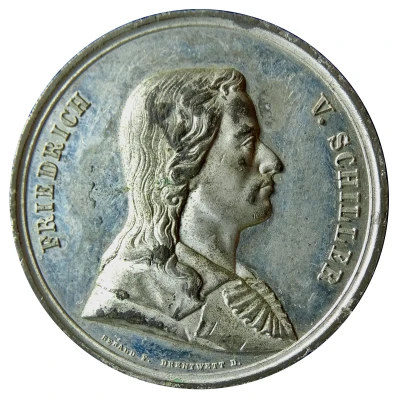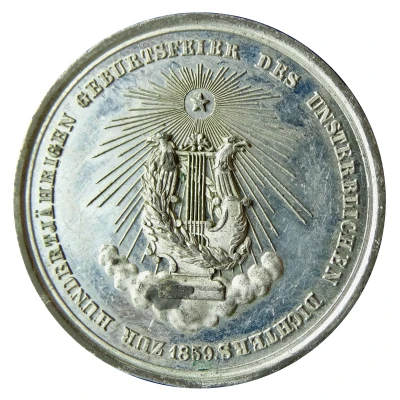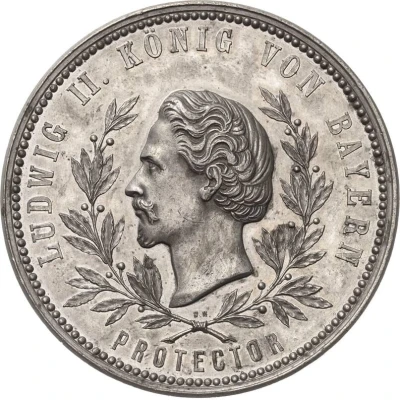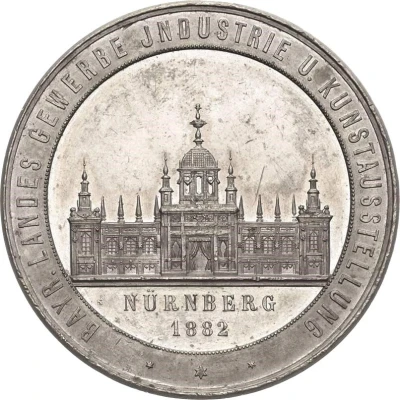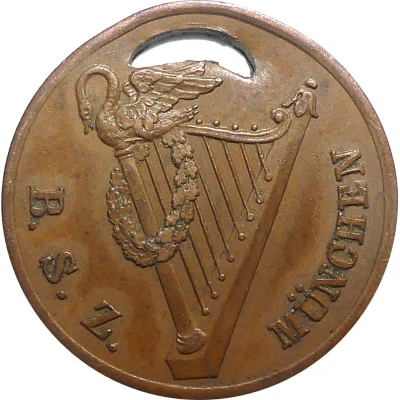
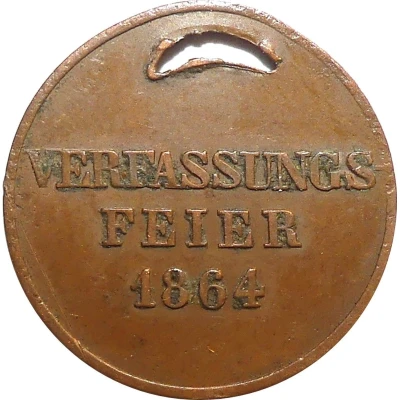

© Collector 86 (CC BY-NC-SA)
München - Verfassungsfeier
1864 year| Bronze | 2.1 g | 20 mm |
| Location | Kingdom of Bavaria (German States) |
|---|---|
| King | Louis II (Ludwig II) (1864-1886) |
| Type | Medals › Commemorative medals |
| Year | 1864 |
| Composition | Bronze |
| Weight | 2.1 g |
| Diameter | 20 mm |
| Thickness | 1 mm |
| Shape | Round with cutouts |
| Technique | Milled |
| Orientation | Medal alignment ↑↑ |
| Demonetized | Yes |
| Updated | 2024-11-14 |
| Numista | N#374308 |
|---|---|
| Rarity index | 95% |
Reverse
Two-line inscription
Date below
Lettering:
VERFASSUNGS
FEIER
1864
Edge
Plain
Comment
The association (the Munich Citizens' Singers' Guild) was founded in 1840 when the group of singers from the Munich Citizens' Association of 1819 formed independently. At that time, Munich was not only the capital of the then Kingdom of Bavaria, but also, to an increasing extent, a European cultural center. The citizens' association was one of the main vehicles of Munich's social and cultural history. The founder and long-standing director of the Bürger-Sänger-Zunft was Carl Stöhr (funerary monument in the Old South Cemetery, where a large number of monuments commemorate famous BSZ members). Stöhr was a master shoemaker from the disbanded Shoemakers' Guild, a backbone of Munich's former Master Singers' Guild, in which Hans Sachs from Nuremberg had also learned to sing. In line with the general evolution of society, the Singers' Association founded in 1840 was no longer intended to bring together only master craftsmen to sing, write poems and make music together, but also citizens with a passion for culture in general. Soon, members of well-known artisan and innkeeper families joined the BSZ, including several members of the Pschorr brewing family, the Neuner family of wine merchants (leaders of the BSZ for almost 100 years), the spice manufacturer Develey and the art printer Obpacher. The most represented occupational group in the guild was that of elementary school teachers, until they founded their own teachers' singing association decades later.By 1860, the BSZ was considered the most important association of singing and music lovers, and cultural enthusiasts in general, in Munich, and remained so for decades. Numerous associations have grown out of it in the course of history, such as the convivial Die Turmfalken, with which close contacts still exist today.
From the outset, close cooperation was established with the city of Munich and its mayors (who later became mayors). Where legally possible, mayors have always been members of the BSZ. BSZ founder Carl Stöhr was also the founder of the Chamber of Crafts for Munich and Upper Bavaria and, as a magistrate, was responsible for social affairs in the municipal government. The BSZ was involved in Stöhr's activities on several occasions, including when Munich's first political party organization, the Märzverein, was founded in 1848. It organized numerous municipal ceremonies and gave benefit concerts for social tasks.
In 1861, it helped found the Bavarian Singers' Federation. The first musical director to leave his mark on the Sängerbund was, from 1862, Konrad Max Kunz, then musical director of the BSZ. BSZ member Wilhelm Neuner was Sängerbund treasurer for over 45 years. Important composers and conductors led the Bürger-Sänger-Zunft: Franz Lachner, Konrad Max Kunz, Max Zenger, Joseph Rheinberger and Richard Trunk. Poets and composers such as Felix Dahn, Martin Greif and Richard Strauss were honorary members.
Translated from https://www.ma-shops.com/macho/item.php?id=1999&lang=fr
